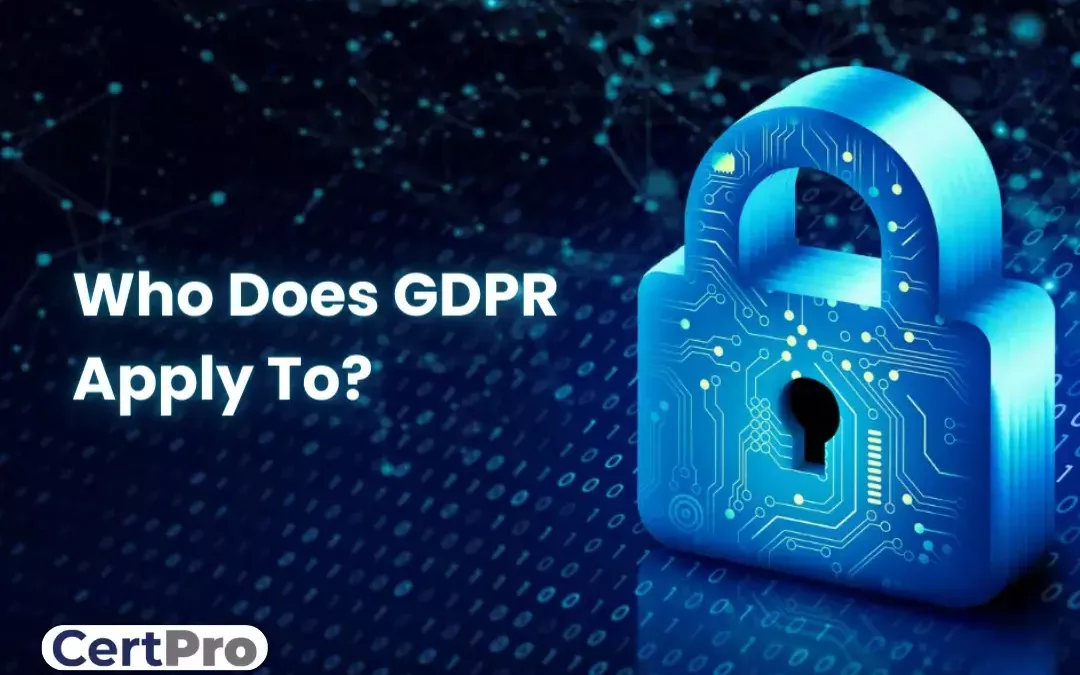The General Data Protection Regulation (GDPR), a transformative force in personal data management and security, represents a paradigm shift in global data protection policy. The GDPR’s impact extends beyond national borders, with the goal of protecting individual rights throughout the European Union (EU) and the European Economic Area (EEA). This rule, which answers the question “who does GDPR apply to?” includes enterprises worldwide that process personal data of EU/EEA residents and those located within these territories. Regardless of location, a firm is subject to the GDPR if it processes the personal data of EU/EEA citizens or monitors their activity.
The GDPR’s broad scope needs strict adherence, particularly in addressing the question “who does GDPR apply to?” in order to ensure accountability, transparency, and enhanced data protection requirements. Adherence to its stringent criteria is crucial for enterprises operating inside or outside the EU/EEA that supply products or services to EU/EEA nationals or monitor their activity. Recognizing GDPR-protected individuals is critical for successfully traversing the complicated terrain of global data privacy legislation and establishing comprehensive data protection policies. The GDPR applies not only to corporations in the EU/EEA but also to organizations worldwide that handle personal data of individuals in these countries, underscoring the global effect and significance of this regulatory framework.
what is gdpr
The European Union (EU) implemented the General Data Protection Regulation (GDPR) in May 2018, marking a watershed point in data protection and privacy law. The GDPR applies to individuals in the EU, with the main goals of enhancing their rights and giving them more control over their personal data. This comprehensive regulation not only affects the principles of personal data ownership, but it also strives to modernize how enterprises, to whom GDPR applies, navigate and follow data privacy requirements. The GDPR seeks to ensure openness, accountability, and ethical data management by placing stringent restrictions on organizations to which the GDPR applies. This vital regulation requires corporations to rethink and improve their data privacy practices, resulting in a more responsible and respectful approach to managing individuals’ personal information across the EU. The GDPR has worldwide ramifications, establishing a precedent for data protection legislation and igniting a bigger global debate about privacy and digital rights.
WHO DOES GDPR APPLY TO?
The General Data Protection Regulation (GDPR), a comprehensive legislative framework, addresses the question of “who does GDPR apply to?”. For organizations that handle the gathering and processing of personal data from people inside the European Union (EU), it has important ramifications. The European Economic Area (EEA), which includes Iceland, Norway, and Liechtenstein, as well as 27 EU members, is under its control. In order to guarantee the protection of EU citizens’ rights and privacy, the GDPR lays out strict responsibilities. Most importantly, it affects non-EU organizations that handle sensitive data belonging to EU individuals, tying them to GDPR rules even outside EU borders. This emphasizes how important international data protection regulations are and how businesses everywhere must follow GDPR guidelines when managing personal data that comes from the EU. Adherence to these requirements is important, underscoring the need to maintain data privacy norms worldwide.
Here are some Key aspects of GDPR include:
1. Protection of Personal Data: The General Data Protection Regulation (GDPR) sets strict rules for how businesses must gather, use, keep, and distribute personal data. It includes any information that may be used to identify a person, either directly or indirectly, and broadens the definition of personal data.
2. Individual Rights: It gives people more control over their personal data, giving them the ability to access it, correct errors, ask for its deletion (also known as the “right to be forgotten”), and, in some cases, object to or restrict processing.
3. Consent and Transparency: Prior to processing personal data, organizations are required to get express and unambiguous consent. They are required to give clear information about the goals, length, and sharing with third parties of the data they handle.
4. Accountability and Governance: GDPR places a strong emphasis on holding companies accountable for their data processing procedures, necessitating the implementation of suitable safeguards to guarantee adherence. Important elements include conducting impact analyses on data protection and keeping thorough records of all data processing operations.
5. Global Impact: The GDPR has an influence on the world even if its main jurisdiction is inside the EU and the European Economic Area (EEA). It covers companies operating outside of the EU/EEA that manage personal data belonging to people living in these areas.
6. Enforcement and Penalties: The General Data Protection Regulation (GDPR) imposes severe fines for non-compliance, amounting to €20 million or 4% of the worldwide revenue each year, whichever is larger. Supervisory authorities in EU member states are in charge of enforcement.
By highlighting the value of privacy rights and placing heavy obligations on businesses that handle personal data, GDPR dramatically raises the bar for data protection standards and establishes a new worldwide norm.
Does GDPR apply to both the EU and EEA?
The General Data Protection Regulation (GDPR) is a crucial framework that oversees data protection and privacy standards throughout the European Union (EU) and the European Economic Area (EEA). GDPR was enacted in May 2018 with the specific goal of establishing universal laws and standards for the management of personal data within these regions.
Notably, the GDPR’s reach includes all 27 EU member states, ensuring that it is immediately applicable across the whole European continent. Furthermore, the Act extends to the entire European Economic Area (EEA), which includes not only EU member states but also Iceland, Liechtenstein, and Norway. This expansion broadens the regulatory reach by applying the GDPR’s principles and provisions to six more EEA countries. Importantly, GDPR applies to personal data processing within these territories, creating a complete framework for data protection and privacy. The major goal of GDPR is to standardize data protection standards, providing consistent safeguarding of personal data across individuals. GDPR supports the creation of a comprehensive framework for data protection procedures by encompassing both the EU and the EEA. This all-inclusive strategy seeks to strengthen privacy rights and establish a feeling of uniformity in data handling by harmonizing policies across these interrelated regions.
In essence, GDPR has a broad influence, affecting not only EU member states but also the extended EEA membership. It is a critical tool for streamlining data protection policies, raising privacy standards, and encouraging a unified approach to data management in the EU and EEA’s dynamic digital ecosystem.
IS GDPR APPLICABLE OUTSIDE OF EUROPE?
Protecting the personal information of citizens and residents of the European Union (EU) is the main objective of the General Data Protection Regulation (GDPR). Under the notion of “extra-territorial effect,” the rule affects firms handling such data worldwide, irrespective of their location.
Even when processing takes place outside of the Union, controllers or processors with an establishment in the EU are subject to GDPR. It also applies when non-EU organizations handle individuals’ personal data within the Union, especially when doing so in order to deliver goods or services or keep an eye on conduct within the EU. Public international law mandates the application of the regulation to controllers outside the Union who are subject to laws from Member States.
The GDPR covers a wide range of companies, including those established in the EU, as well as non-EU entities that handle personal data belonging to EU citizens under certain circumstances.
Does the GDPR apply to an individual?
The General Data Protection Regulation (GDPR) primarily governs how businesses, companies, and organizations handle personal data, rather than having an immediate impact on individuals. Nevertheless, because GDPR gives individuals greater rights and protections for their personal data, it has a big impact on people. GDPR applies to the processing of personal data by businesses, guaranteeing that individuals have greater control over the use and protection of their information. This comprehensive rule improves data privacy and security by giving people rights like the ability to access, correct, and erase personal data held by companies. Individuals in the European Union (EU) and the European Economic Area (EEA) have strong rights over their personal information, according to GDPR. Individuals have the right to access the data stored by organizations, rectify errors, request the erasure of their data in specific situations (referred to as the “right to be forgotten”), and restrict or object to the processing of their data.
Although people are not directly required to comply with GDPR, it has a big impact on how businesses gather, use, and store personal data. People have the ability to hold companies responsible for following GDPR regulations and using their data protection rights. The primary impact of GDPR on individuals is the notable reinforcement of their rights and control over their personal data, thereby ensuring enhanced accountability, transparency, and privacy safeguards in the digital age. GDPR applies to individuals by giving them basic rights, such as the right to access, correct, and erase personal data held by companies. This extensive regulation promotes a higher degree of control and privacy by guaranteeing that people have a role in how their information is treated. GDPR emphasizes its broad applicability and influence on individuals’ data rights by clearly defining the obligations of companies in managing personal data. This sets the bar for data protection across numerous sectors and industries.
Does the GDPR Affect Organizations in the Public Sector?
Yes, the General Data Protection Regulation (GDPR) impacts public sector organizations. The GDPR applies to both public and private sector enterprises that process personal data. This all-inclusive law establishes a uniform norm for data security that applies to public agencies, government departments, and other public sector organizations. It assures that public institutions, like their counterparts in the commercial sector, must respect individuals’ rights and privacy while processing personal data by highlighting the application of GDPR principles to public organizations. Its uniform and extensive implementation highlights the GDPR’s dedication to promoting a high standard of data security and privacy across various societal sectors.
Here are some key Impacts on Public Sector Organizations:
1. Data Handling Standards: Data Management Guidelines: Government departments, agencies, and local authorities are among the public sector entities that are required to adhere to the strict data privacy regulations set out by GDPR. They have an obligation to make sure that personal data is processed legally and openly.
2. Individual Rights: Under the GDPR, people have more rights with respect to their personal data. Access to data, correction, erasure, and the ability to object to or restrict processing are among the rights that public sector organizations are required to provide.
3. Accountability and Compliance: To show that they are in compliance with the GDPR, public sector entities must implement strong data protection procedures. This entails carrying out evaluations of the effects of data protection, keeping track of processing operations, and putting in place the organizational and technological safeguards required to guarantee data security.
4. Sensitive Data Handling: The GDPR places more stringent rules on the processing of personal data that is considered sensitive, such as criminal offense or health record data. When managing such data, public sector organizations are required to follow stronger processing guidelines and take more precautions.
5. Cross-Border Data Transfers: The GDPR’s rules on international data transfers are applicable to public sector organizations that conduct business across borders inside the EU/EEA. To provide a comparable degree of security, sufficient safeguards must be in place when transferring personal data beyond the EU/EEA.
The General Data Protection Regulation (GDPR) has a noteworthy influence on companies in the public sector. Compliance with its rules is imperative to ensure appropriate management, protection, and dignity of individuals’ personal data. In addition to avoiding heavy fines, compliance promotes public confidence in the data management procedures used by governmental entities.
FAQ
Who does GDPR apply to geographically?
GDPR applies to organizations based in the European Union (EU) as well as those outside the EU that offer goods/services to individuals in the EU or monitor their behavior.
Do small businesses need to comply with GDPR?
Yes, even small businesses are subject to GDPR if they process personal data of EU citizens or residents, unless they fall under certain limited exemptions.
Does GDPR apply to data processors or only data controllers?
Both data controllers (entities determining how and why personal data is processed) and data processors (entities processing data on behalf of controllers) must comply with GDPR.
Are public authorities subject to GDPR?
Yes, public authorities processing personal data must comply with GDPR, ensuring the protection and privacy of individuals’ data.
Are there penalties for non-compliance with GDPR?
Yes, organizations failing to comply with GDPR can face substantial fines, up to 4% of annual global turnover or €20 million, whichever is higher.

About the Author
BHOOMIKA JOIS
Bhoomika Jois is a creative content writer specializing in compliance, ISO 27001, GDPR, and SOC 2. As a Social Media Marketing Specialist, she amplifies her engaging content. Bhoomika’s knack for simplifying complex topics makes compliance and cybersecurity accessible to all.
HOW TO CONDUCT A GDPR AUDIT FOR MY BUSINESS?
The General Data Protection Regulation (GDPR) is vital for today's digital landscape. It is a cornerstone for safeguarding people's privacy rights in the European Union (EU). Therefore, organizations dealing with EU residents' data must follow these GDPR rules....
GDPR DATA BREACH NOTIFICATION: THE ULTIMATE GUIDELINE FOR SECURING DATA
Modern businesses require incorporating personal data protection strategies to ensure customer satisfaction and business growth. In this respect, the European Union's General Data Protection Regulation (GDPR) sets strict standards for maintaining data security....
GDPR Compliance Software: Boosting Business Efficiency
Handling large amounts of personal data has become a significant concern in today's digital landscape, necessitating a thorough understanding of the intricate legal framework, particularly within the European Union. An essential piece of legislation in this regard is...




